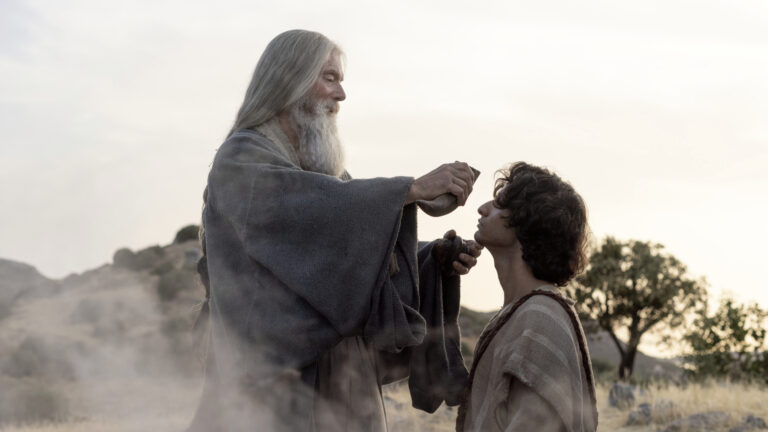Professor, apologist, novelist, literary critic, fantasy writer, philosopher, theologian, and ethicist, C. S. Lewis has profoundly influenced how millions read literature, make moral choices, think about God, and live out the Christian faith. By means of a genial blend of reason and imagination, logic and fantasy, profound academic insight and good old common sense, Lewis has challenged the modern world to examine the claims of Christ, the Bible, and the church; experience the goodness, truth, and beauty of literature; and expand its vision of God, man, and the universe.
In his ebook A to Z With C. S. Lewis, Louis Markos enlists Lewis’s aid to study, both theoretically and practically, topics of particular interest to the early 21st century. The following excerpt includes the entries on “Aslan” and “Jesus.”
Aslan
As an English professor, I have spent the last two decades guiding college students through the great books of the Western intellectual tradition. And yet, though I have taught (and loved) the works of Homer, Sophocles, Virgil, Dante, Chaucer, Shakespeare, Milton, and Dickens, I do not hesitate to assert that Aslan is one of the supreme characters in all of literature. Though many readers assume that Aslan, the lion king of Narnia who dies and rises again, is an allegory for Christ, Lewis himself disagreed.
According to his creator, Aslan is not an allegory for Christ but the Christ of Narnia. The distinction is vital. Were Aslan only an allegory, a mere stand-in for the hero of the Gospels, he would not engage the reader as he does. In fact, as Lewis explained, Aslan is what the second person of the Trinity (God the Son) might have been like had he been incarnated in a magical world of talking animals and living trees. As such, Aslan takes on a force and a reality that speaks to us through the pages of the Chronicles of Narnia.
In Aslan, we experience all the mighty paradoxes of the incarnate Son: he is powerful yet gentle, filled with righteous anger yet rich with compassion; he inspires awe and even terror (for he is not a tame lion), yet he is as beautiful as he is good. The modern world has ripped apart the Old and New Testament, leaving us with two seemingly irreconcilable deities: an angry, wrathful Yahweh who cannot be approached, and a meek and mild Jesus who is too timid to defend his followers from evil. Aslan allows us to reintegrate—-not just intellectually and theologically, but emotionally and viscerally as well—-the two sides of the triune God who calls out to us on every page of the Bible, from Genesis to Revelation.
Every time a character comes into the presence of Aslan, he learns, to his great surprise, that something can be both terrible and beautiful, that it can provoke, simultaneously, feelings of fear and of joy. Borrowing a word from Rudolf Otto, Lewis referred to this dual feeling as the numinous. The numinous is what Isaiah and John felt when they were carried, trembling and awe-struck, into the throne room of God, and heard the four-faced cherubim cry out “holy, holy, holy!” It is what Moses felt as he stood before the burning bush, or Jacob when he wrestled all night with God, or Job when Jehovah spoke to him from the whirlwind, or David when he was convicted of his sin with Bathsheba and experienced (all at once) the wrathful judgment and infinite mercy of the holy one of Israel.
Our age has lost its sense of the numinous, for it has lost its sense of the sacred. Through the character of Aslan, Lewis not only instructs us in the nature of the numinous, but trains us how to react when we are in its presence. When we finish the Chronicles, we may not be able to define the numinous, but we know we have felt it: each and every time Aslan appears on the page.
Jesus
No person has ever had a greater effect on the history of the world, and yet no person has been the focal point of more controversy and strife. No person has ever been worshiped with such devotion or manipulated with such selfish ingenuity. For well over a century, an ever-changing band of biblical “scholars” (some of them genuine, but most of them self-appointed) have organized themselves under the rubric of the Jesus Seminar and taken as their goal the grail-like search for the “historical Jesus.”
Sadly, though the majority of their findings are based on their readings of Matthew, Mark, Luke, and John (with an occasional gnostic gospel thrown in), most members of the Jesus Seminar refuse to treat the canonical Gospels with the respect they deserve. And that despite the growing number of historians and textual critics who have judged the Gospels to be reliable historical documents based on eyewitness accounts that corroborate, rather than duplicate, one another.
Though C. S. Lewis was not a trained biblical scholar, he was an expert reader of literature with a fine eye for the distinctions between genres. Long before modern scholarship confirmed the historical accuracy of the Gospels, Lewis had already explained to his readers that the Jesus of the Gospels and the “historical Jesus” of revisionist scholarship were one and the same.
Anyone who reads the Gospels alongside other ancient texts will immediately see the difference. There is nothing legendary about the Gospels. They are, Lewis asserts, sober biographies grounded in real, down-to-earth details—-the kind of details that do not appear in literature until the 19th century. As for Jesus himself, he emerges from the Gospels with a concrete reality that surpasses all other figures in the ancient world (only Socrates comes close). When we read the Gospels, we know Jesus in a way we do not know anyone else before the modern period.
As for the claims Jesus makes in the Gospels, Lewis, in what is perhaps his best known apologetical argument, defuses all those critics who would treat Jesus as a good teacher or prophet and nothing more. In Mere Christianity (II.3), Lewis gives the lie to this attempt to domesticate and defang the historical Jesus of the Gospels.
Again and again, Lewis reminds us, Jesus makes incredible claims about himself: he is the Way, the Truth and the Life; he is the Resurrection and the Life; he is one with the Father; he has the authority to forgive sins; he calls on people to follow him (and not just his teachings); he takes upon himself the power to reinterpret the Law.
A person who made these claims and was not the Son of God would not be a prophet or even a good man. He would either be a deceiver on a grand scale or a certifiable maniac. Yet the overwhelming consensus of the Gospels and of those who knew Jesus rule out the possibility that he was either a liar or a lunatic. Once these two options are eliminated, however, we are left with only one possibility: that he was who he claimed to be.
And that is why Lewis concludes that we can shut Jesus up as a lunatic, kill him as a devil, or fall at his feet in worship—-but “let us not come with any patronizing nonsense about his being a great human teacher. He has not left that open to us. He did not intend to.”
20 Things You Can Do Right Now to Prevent Dechurching
 We’re currently experiencing the largest and fastest religious shift in the history of the United States. But there are practical things we can do inside our local churches.
We’re currently experiencing the largest and fastest religious shift in the history of the United States. But there are practical things we can do inside our local churches.
Jim Davis and Michael Graham have commissioned the largest and most comprehensive study of dechurching in America. Informed by their findings, they’ve written a book and developed this corresponding toolkit with resources to help you address the dechurching phenomenon.
We’re delighted to offer you the ‘Rechurching Toolkit’ for FREE today. Click on the link below to get instant access to this resource—worth $100—and be equipped to understand and address the issues behind dechurching.


































